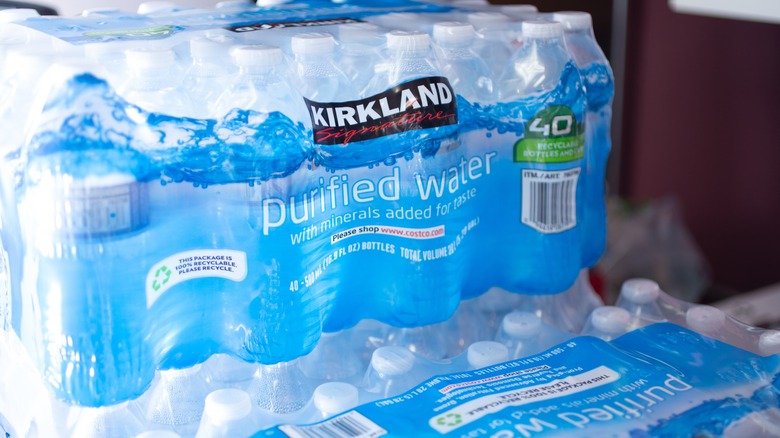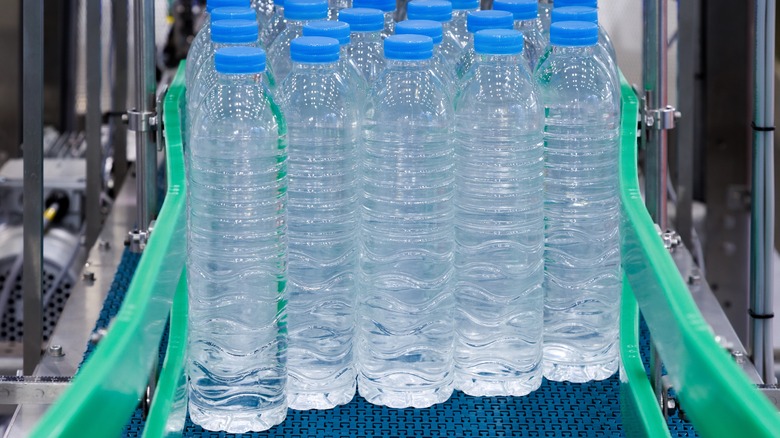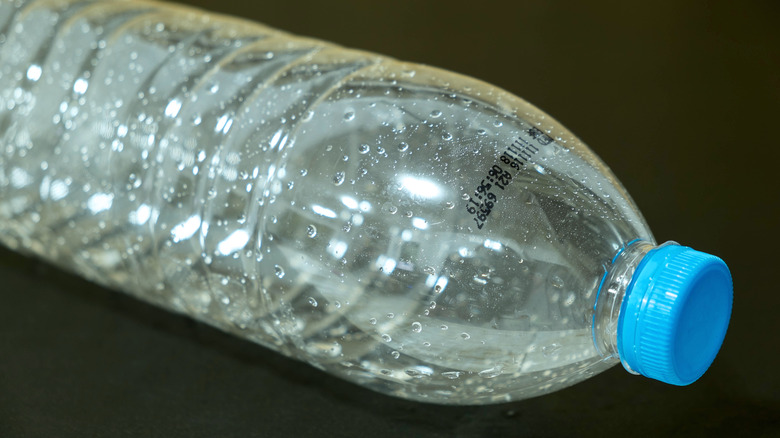Think Twice Before Storing Your Bottled Water In The Garage
When you store fresh produce at home, you're probably used to placing it adjacent to paint thinner and household cleaning products, right? That statement probably gave some people fits, but it drives home the concept that keeping anything you will consume next to questionable substances is never wise. It also begs the question -– why are so many people okay with storing bottled water in areas where chemicals are rampant?
Bottled water can be lifesaving during natural disasters, and once emptied, their versatility shines for tasks like separating eggs. But storing them requires some careful consideration. They should be stored with the same care you store your food. Just as germs and chemicals can attach to any fresh meat or produce near their surroundings, plastic bottles can accumulate particles you would rather not have near your mouth. Germs and chemicals that plant themselves on your plastic bottles can be transferred to your hands when you pick them up and spread to anything you touch afterward.
Plastic containers used to hold water are also porous, meaning they can take on odors from nearby substances and create an unpleasant drinking experience. If you've got a spare gas can sitting around in the garage near your H2O, you may notice a bitter chemical taste when you take a sip. This is reason enough to avoid storing any popular bottled water brands in the garage, but there is an even greater reason that pertains to the makeup of the bottles themselves.
The plastic itself is also a problem
It's not just the outside of the bottle that can harbor potentially harmful chemicals. Over the years, there has been some concern over dioxins and DEHA (diethylhydroxylamine) leaching into water from its container, but neither dioxins nor DEHA are used to make plastic water bottles. They are likewise not created from the plastic breaking down over time. However, there are other chemicals used to create the plastic that can be problematic.
Polyethylene terephthalate (PET) is used to manufacture single-use disposable bottles. PET is known to leach antimony — a harmful metal that can cause problems in the stomach, lungs, and heart. The plastic polymers that comprise the structure of these products can degrade and seep into whatever they contain inside, and heat is what facilitates this deterioration. The hotter it is, the more these chemicals break down and transfer to the contents within the bottle.
A garage can fluctuate in temperature quite a bit. In the warmer summer seasons, they can often be 15 degrees hotter than the outside climate, meaning anything stored inside could be subject to extreme heat conditions. This makes it more likely chemicals will leach from the plastic into the liquid. If your garage is air conditioned this might not be a concern, but bear it in mind next time you think about leaving your bottled water in your car on a sweltering summer afternoon.
Does bottled water expire?
The FDA does not have any specific measurement for how long bottled water lasts, leading many to believe it will last indefinitely. Most industry experts, however, identify the shelf life of bottled water as two years. It will survive until your next birthday and perhaps the one after that, but don't count on it being a quality product if you are storing it for the zombie apocalypse.
For bottled water to have the best chance at a long shelf life, you want to avoid storing it in direct sunlight and locations subject to extreme heat -– like a garage or a car. You want to keep it in a cool, dry, and dark environment. An optimal site would be a pantry that stays sufficiently cool. A wine cellar or basement should also work, but remember that if the area is musty, the porous plastic allows the liquid to take on that odor over time.
One of the best places to store bottled water is in the fridge. While any foods with intense aromas — like stinky cheeses you might be dying to try — may impact the flavor of it because the plastic is permeable, the cold temperature will inhibit the deterioration of the plastic. You won't be able to fit as much of it in your refrigerator as you could in your garage, but you will be able to rest easy knowing it's stored in a location void of germs and other chemicals.


